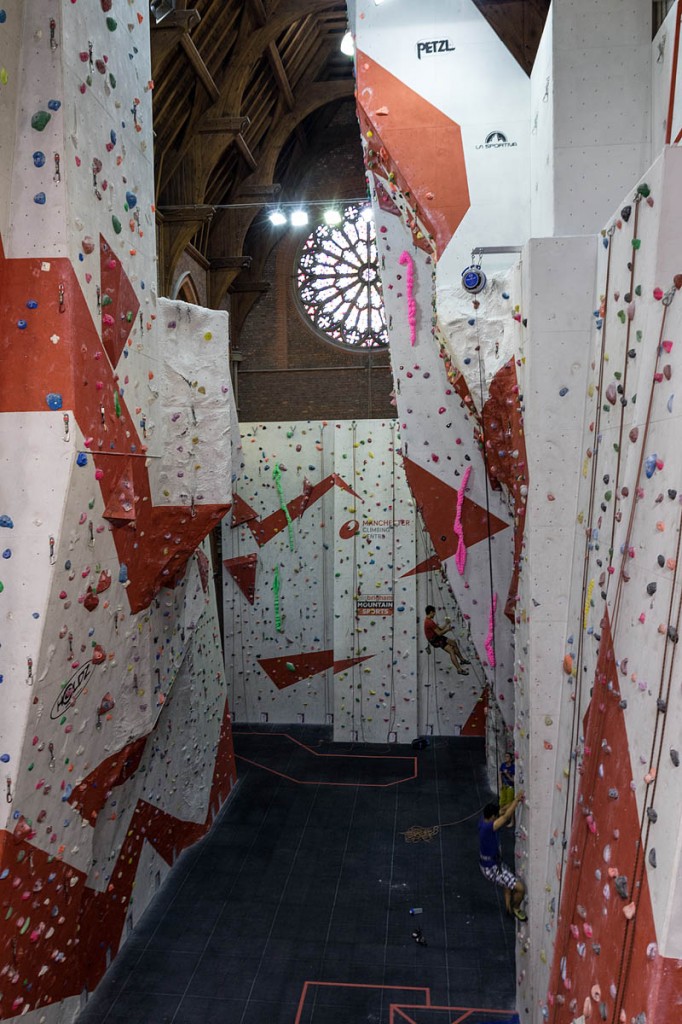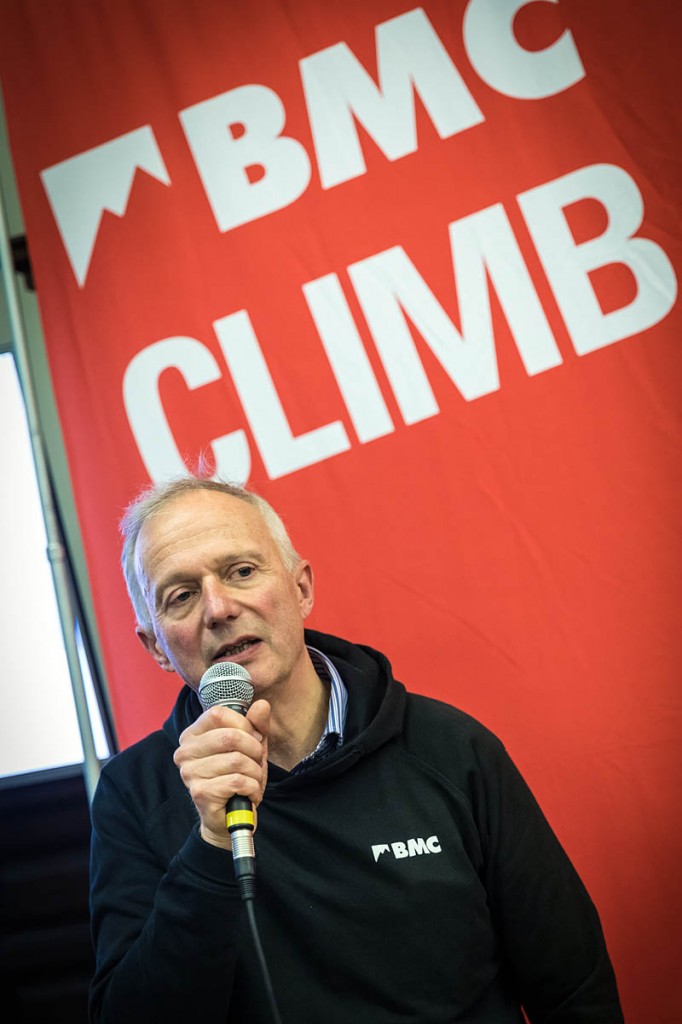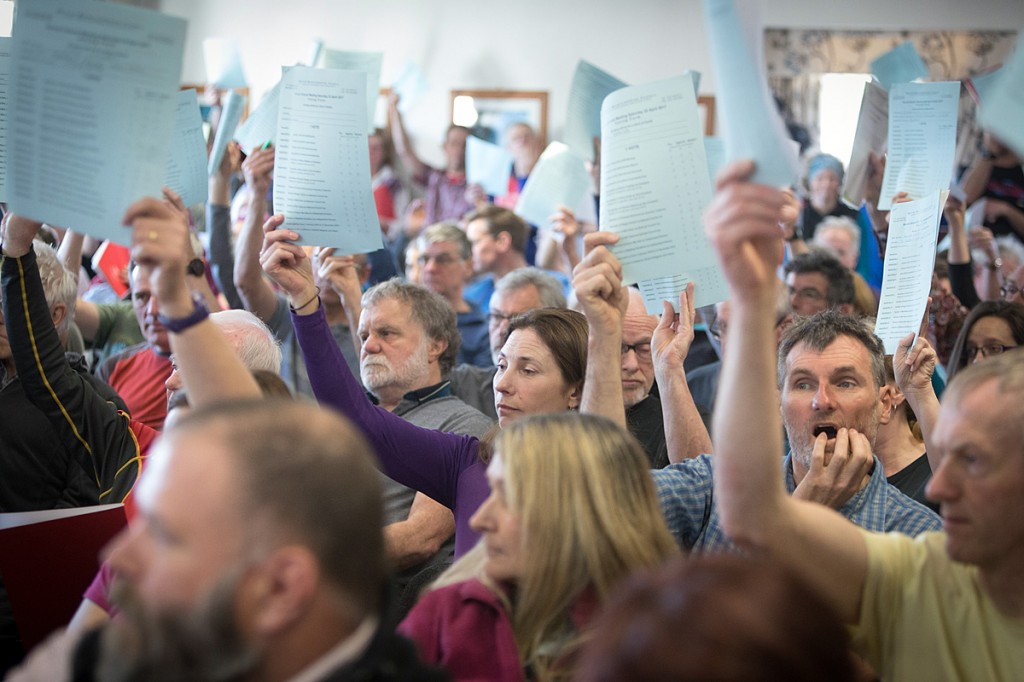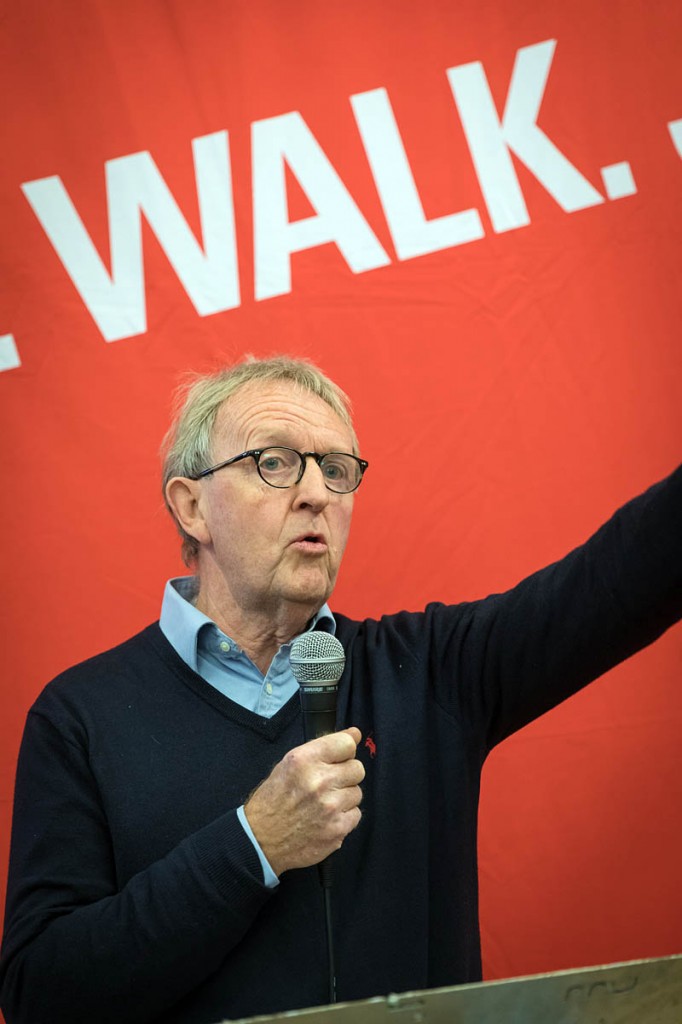
Ray Wigglesworth outlines his vision for the future at Kendal Mountain Festival. Photo: Bob Smith/grough
Seven months ago, 170 or so members of the British Mountaineering Council crowded into a meeting room at the National Mountain Centre at Plas y Brenin in north Wales.
The council’s executive committee faced a motion of no-confidence, tabled by what had become known as the ‘BMC 30’, a group of disaffected members who fundamentally disagreed with the direction the organisation had taken.
The 30, who included at least one patron of the BMC and many of whom were eminent and experienced mountaineers and climbers, were scathing about the botched renaming of the council as Climb Britain, and many also objected to the rising prominence given to competition climbing.
The motion was overwhelmingly defeated, but president Rehan Siddiqui, tired of what he saw as a politically motivated attack, resigned.
One of the outcomes of the rancorous meeting was the agreement to set up an organisational review, though the BMC said one had already begun a couple of months earlier. The group tasked with the job was chaired by Ray Wigglesworth, a climber and crown court judge. Other members were Rebecca Ting, John Roberts, Tim Strong, Rab Carrington and Fiona Sanders. BMC directors Matthew Bradbury and Simon McCalla shared a post, and Paul Caddy was involved for part of the process but resigned to be replaced by Mr Strong.
The review has cost the BMC’s 85,000 members more than £41,000, including legal fees of £15,000 to the firm of Womble Bond Dickinson, £6,700 for a members’ questionnaire, and a payment of £5,000 to Mr Wigglesworth, with a further £4,000 to come.
The results of the review were revealed at last weekend’s Kendal Mountain Festival and included 51 recommendations.
The key points were that the current national council should be disbanded and replaced with a members’ assembly, and the existing executive committee should become a board of directors, with legal responsibility for the organisation, which should remain a company limited by guarantee.
The review body also recommends the BMC becomes less dependent on Sport England funding and financially stable. Better diversity is also important too; at least 30 per cent of proposed bodies should come from one gender. Currently, only 27 per cent of the mountaineering council’s membership are women.
The report paints a picture of a changing world of mountaineering, where 72 per cent of members surveyed now use indoor climbing walls. More people nationally are active in climbing and mountaineering, which includes mountain walking, than those who participate in playing golf and only slightly fewer than those who play football, with more than two million people taking part in the activities covered by the BMC, according to a Sport England survey.
The review group also had to deal with the perceived lack of democracy in the membership organisation. The report says: “It is impossible not to refer back to the rebranding of the BMC in the context of this review. This episode was the catalyst which caused many members to look at the processes involved in BMC decision making. Though the BMC followed all the rules about policy making within the [memorandum and articles of association], the membership felt they were not consulted.”
On communication and management, the report says: “One in six [members] rate it as performing not very or not at all well. Those who feel the BMC is performing not very or not at all well are relatively more likely to be drawn from older age groups.
“Many of those who feel the organisation is not performing well refer back to the Climb Britain rebranding, and evidence this as a failure by the BMC to listen to and consult with its membership.
“There is a concern that the organisation is being moved too much towards competition and sport climbing, away from its original roots.
“Members would like to be kept abreast of key information through regular email contact, and also through informed articles in Summit magazine. It was felt that the balance of communications from the BMC was overly focused on sales activity. Information (by email and on the website), needs to be kept up to date.”
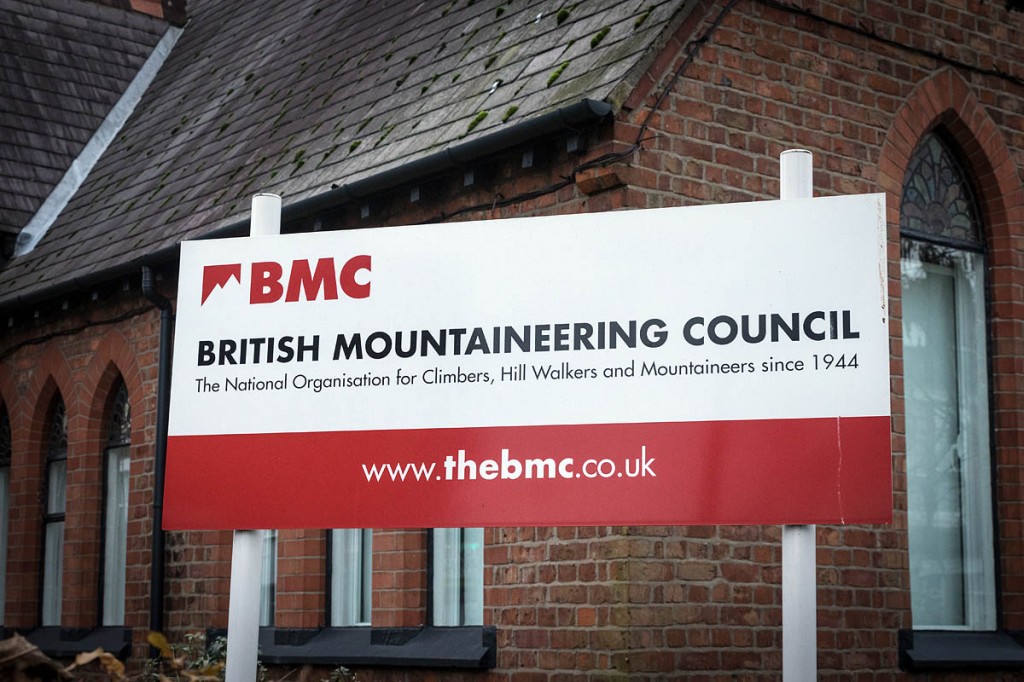
The British Mountaineering Council's headquarters in Didsbury, south Manchester. Photo: Bob Smith/grough
Many members take part in numerous activities under the mountaineering umbrella, from indoor climbing to rock-climbing and hillwalking. 38 per cent undertake all four activities: hillwalking, mountaineering, rock-climbing and indoor climbing. Interestingly, 11 per cent of those who undertake regular hillwalking said that was their sole activity on the mountains. Some traditionalists disapproved of the emphasis on sport climbing.
The review group said: “A few members expressed dissatisfaction for the BMC’s support of competitive activities. On the other side, hillwalkers and competition climbers felt disenfranchised by a perceived overemphasis on climbing and mountaineering, and lack of support respectively.”
The report acknowledges the concerns of many members that the organisation’s leadership had become remote. It said: “The BMC must therefore reframe policies, strategies and structures to put members back at the heart of the organisation going forwards. It must also ensure that its officers and bodies inform – and are accountable to – the broader membership through a democratic process.”
To that end, it proposes to do away with the existing national council and to replace it with a new members’ assembly. This would be chaired by the president, whose appointment would be subject to members’ approval at the annual general meeting.
The assembly would have local area representatives, one appointed at each of the 10 local areas’ AGMs. There would be four co-opted members chosen for their skills; the chairs of the specialist committees would also sit on the assembly, along with a non-voting staff member and one member from the partners’ assembly, a new body proposed by the review for organisations such as the mountain training bodies and other councils.
The president should be a respected mountaineer, hillwalker or climber, it added.
It is important to recognise the importance of indoor climbing, the report said. “Indoor climbing is an activity in its own right and is only going to grow in the future.
“It is also already a significant part of current BMC members’ experience of climbing, hillwalking and mountaineering. Therefore to remain a representative body for its members, the BMC cannot side-line this activity.”
There is acknowledgement of the failure of the organisation to act in a transparent way and that it does not have a clear strategy for modern times. “The BMC is presiding over one of the nation’s largest mass participation activities and the entry of climbing into the Tokyo Olympics – an opportunity that will surely raise the profile of climbing, and the BMC, to a new generation,” the review group says. “It is not to say that the BMC has neglected strategic review, or development, more that its messaging and narrative around its purpose and mission have become less than clear. The Climb Britain rebranding (and subsequent retraction) is an example of good intentions executed poorly.
“Rightly, the membership reacted badly to this change, feeling that it had not been consulted and didn’t understand the underlying reason for the change.
“Transparency and democracy in all its dealings must be at the forefront of its strategy and governance model.”
As interest in competitive climbing increases, which itself leads to greater opportunities to increase BMC membership, the review body said there should be a separate governing body subsidiary to manage competitive activities and support elite climbers such as those in Team GB.
There should also be a separate subsidiary for the BMC’s operations in Wales, it said.
On governance, the report recommends the appointment of two senior directors in addition to the existing chief executive. The new board of directors should have an independent chair, approved by the AGM.
Crucially, board decisions such as a name or branding change, major acquisitions and borrowing or spending would be subject to approval of the members’ assembly.
After each board meeting, a ‘communiqué’ should be published on the BMC website, containing a summary of the meeting’s key discussions and themes.
Patrons should be subject to a code of conduct, the review body says, but does not recommend any changes to the current make-up of the group of patrons.
New articles of association will need to be drawn up to comply with company law, and these should be reviewed every three years.
The BMC has now entered its next phase of consultation, with area meetings scheduled throughout November and a national council meeting in early December.
Members will then be asked to approve the changes at the AGM, which is planned for April 2018. At least 75 per cent of those voting, either in person or by proxy, will need to vote in favour. Members will, in the meantime, be asked to take part in a consultation survey and affiliated clubs asked for their views, as will staff, partner organisations and patrons.
The full report and the 51 recommendations can be seen on the BMC’s website.
